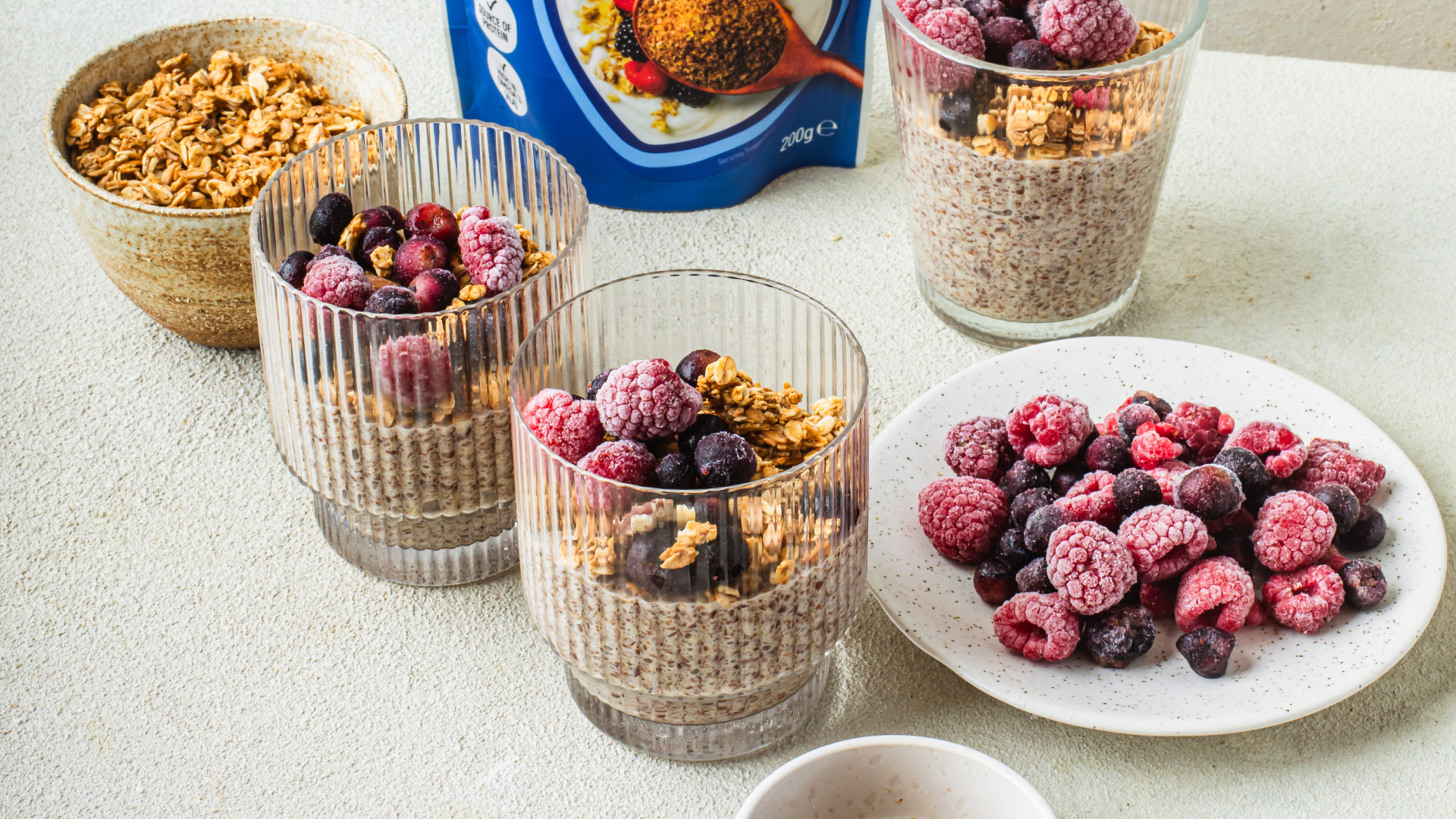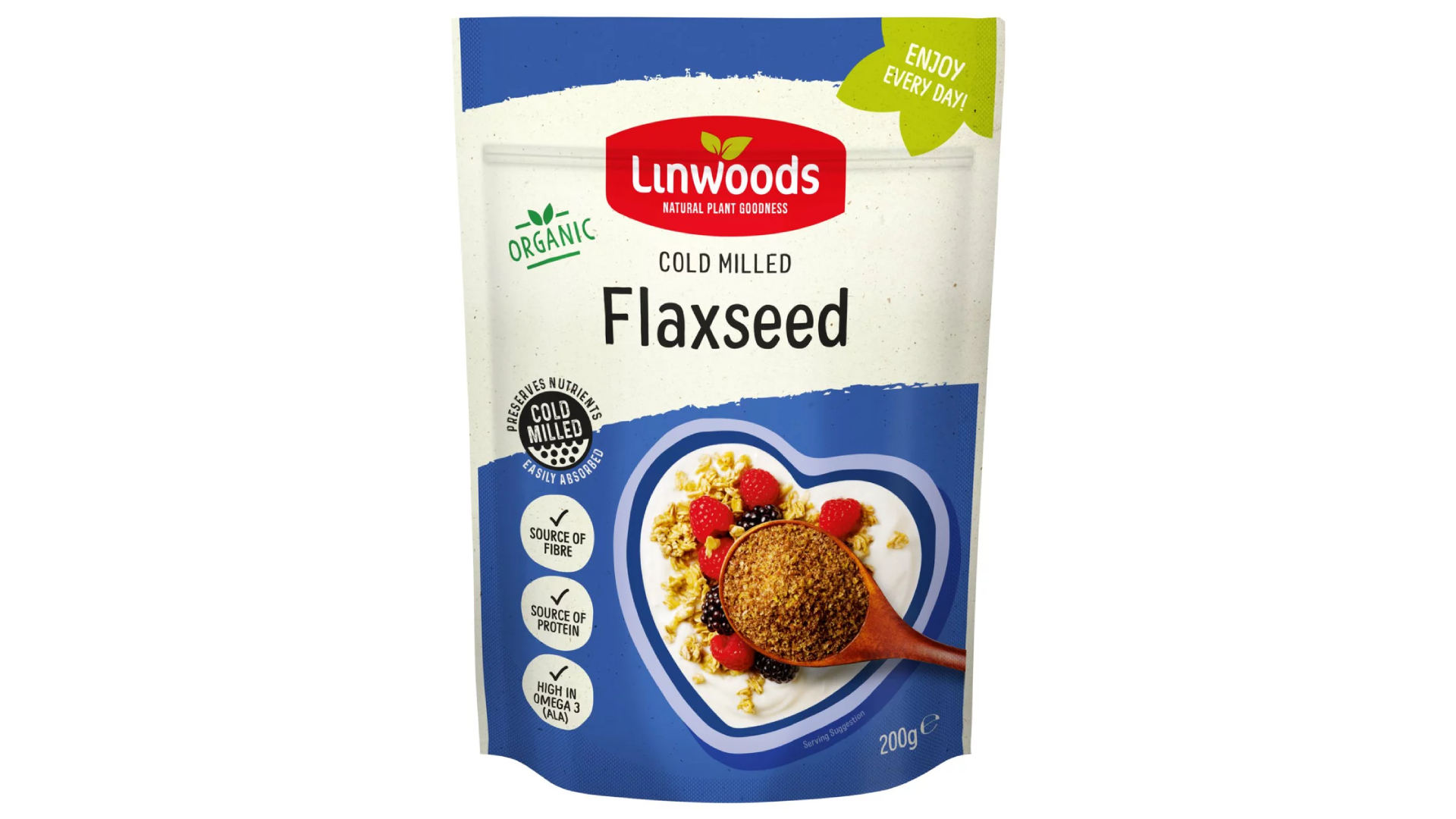How to up your fibre intake and improve your diet with Linwoods Milled Organic Flaxseeds
Fibre is very important for our health, but according to government figures, you’re probably not getting enough.


Incorporating 20g Linwoods flaxseed into your diet daily is an easy way to increase your fibre, omega 3 and magnesium intake.
Flaxseeds are high in omega 3 and a source of fibre, magnesium and plant protein. A 20g serving of Linwoods Milled Organic Flaxseeds (or two dessertspoonfuls) contains 4.1g of fibre, 4g of Omega 3, 17% of your recommended intake of magnesium and 5g of plant protein. It can help to maintain normal blood cholesterol levels, support bone health, support your energy levels and help keep you feeling full for longer
Whole flaxseeds can be hard for our bodies to digest, so in order to get the maximum benefit a milled variety is preferable.
Linwoods use a cold mill process to grind organic flaxseeds to a powder-like substance. This retains the nutritional benefits of the flaxseeds while transforming them into a versatile ingredient that is easy to incorporate into a balanced diet. Flaxseeds have a mild nutty flavour that conveniently adds extra goodness to your meals.
They can be added to smoothies, yogurt, or baked goods, or even stirred through salads or added to dressings and sauces. Linwoods Milled Flaxseeds are suitable for all diets as they are organic, vegan and gluten free.

Flaxseed are a great source of fibre
Although we should consume 30g of fibre a day, adults in the UK eat an average of just 20g. Getting a daily dose of fibre may lower the risk of heart disease, stroke, type 2 diabetes and bowel cancer.
Wholegrain breakfast cereals and porridge are both sources of fibre, as are fruit, seeds and nuts. Flaxseeds are a fibre powerhouse; two dessertspoonfuls of milled flaxseeds contains around 4g of fibre. Sprinkling milled flaxseeds over yogurt will add fibre and is a convenient way to kick off the day with a healthy breakfast.
Flaxseeds contain soluble fibre which our bodies digest slowly. This will leave you feeling fuller for longer and may help to reduce blood sugar spikes. Over time blood sugar spikes can lead to type 2 diabetes, so as well as limiting the intake of sugary foods it's good to avoid eating sugar on an empty stomach and increase the amount of fibre in your diet.
Fibre is also helpful for easing constipation, and a high-fibre diet may help improve bowl regularity.
Flaxseeds to maintain normal Blood Cholesterol Levels
ALA (alpha-linolenic acid) is a variety of Omega 3 that comes from plants. It has been linked to maintaining normal blood cholesterol levels. A 20g serving of milled flaxseeds naturally provides 4g of Omega 3 (ALA). Our body does not naturally produce Omega 3 so it’s essential to obtain it from the food we eat. The beneficial effects are obtained from a daily intake of 2g ALA.
Eating flaxseeds to support energy levels
Magnesium is an essential mineral that enables our bodies to convert food into energy and reduce tiredness and fatigue. Women should have 270mg of magnesium per day of which one portion of milled flaxseeds provides 17%. A lack of magnesium may cause you to feel drained, regularly suffer from cramps or have a twitch. The NHS may suggest a magnesium test if you have these symptoms. You could pair milled flaxseed with other foods high in magnesium such as leafy greens and salmon and see if it perks you up!
While we’re on the topic of energy, flaxseeds are also a fantastic source of plant-based protein. A 20g serving contains 5g of protein. Protein is an essential energy source that contributes to the growth and maintenance of muscle mass and bones.
Small but mighty flaxseeds are packed full of goodness and a daily sprinkle will simply add a wide range of health benefits to your diet.
Sign up for the woman&home newsletter
Sign up to our free daily email for the latest royal and entertainment news, interesting opinion, expert advice on styling and beauty trends, and no-nonsense guides to the health and wellness questions you want answered.
Rose Fooks is the Deputy Food Editor at woman&home. Rose completed a degree in Art at Goldsmiths University before beginning her career in the restaurant industry as a commis chef at The Delaunay in 2015. She then worked at Zedel and went on to become part of the team that opened Islington’s popular Bellanger restaurant.
To hone her patissier skills, Rose joined the Diplome de Patisserie and Culinary Management course at Le Cordon Bleu. She ran a food market in Islington and cooked for a catering company that used only surplus food to supply events, before finding her way into publishing and food styling.
-
 Floral and instantly mood-boosting - our beauty team's May nails are like a sunny day in manicure form
Floral and instantly mood-boosting - our beauty team's May nails are like a sunny day in manicure formStuck for May manicure ideas? Our beauty team have already got theirs sussed and they're as pretty as they are versatile
-
 Helen Mirren's favorite luxury perfume smells 'gorgeous' and deserves a spot in your scent collection
Helen Mirren's favorite luxury perfume smells 'gorgeous' and deserves a spot in your scent collectionThis subtle, citrusy scent is so chic for summer
-
 woman&home Easter Food Awards 2025: Best Easter Rosé
woman&home Easter Food Awards 2025: Best Easter RoséAdd a little splash of something special to your Easter treats with our expert-picked range of rosé wines and Prosecco
-
 woman&home Easter Food Awards 2025: Best hot cross buns and Easter bakes
woman&home Easter Food Awards 2025: Best hot cross buns and Easter bakesOur food experts tuck in to the finest baked goods and hot cross buns available this Easter
-
 woman&home Easter Food Awards 2025: Best Easter eggs
woman&home Easter Food Awards 2025: Best Easter eggsThanks to our food experts, we've cracked the case of where to buy the best Easter eggs this year
-
 What size turkey do you need this Christmas? A guide on what to get depending on how many people you’re feeding
What size turkey do you need this Christmas? A guide on what to get depending on how many people you’re feedingWorking out which turkey size you need this year has never been easier
